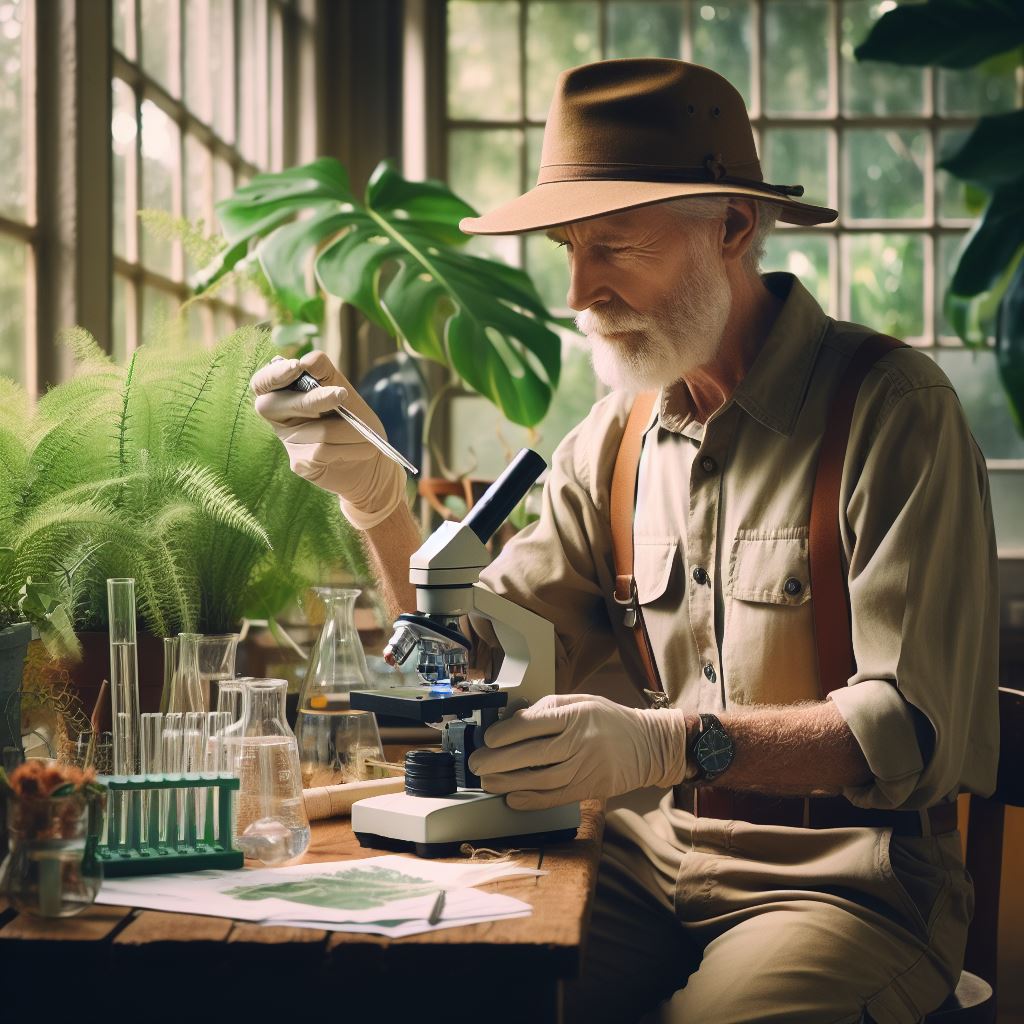Introduction
Embarking on a biology career in Australia unveils a captivating journey, offering endless possibilities for aspiring scientists.
The nation’s diverse ecosystems, rich with unique flora and fauna, provide an ideal backdrop for researchers to delve into profound studies and contribute meaningfully to the field.
Choosing biology as a career transcends the mere observation of plants and animals; it entails a comprehensive study of life in all its intricate forms.
Biologists play a pivotal role in addressing global challenges like climate change, biodiversity loss, and emerging diseases.
A biology career unfolds a vast landscape of opportunities for individuals to actively engage in groundbreaking discoveries.
It empowers them to develop innovative technologies shaping the world and influencing policies for a sustainable planet.
From wildlife conservation to medical breakthroughs, biology transforms the world we inhabit.
Moreover, being a biologist offers avenues for personal and professional growth.
It allows individuals to engage in interdisciplinary collaborations, work across diverse settings, and expand their knowledge through ongoing research and technological advancements.
The dynamic nature of biology ensures professionals are on a perpetual journey of exploration, discovery, and contribution to our understanding of life and the world.
Becoming a biologist in Australia promises an exciting journey filled with possibilities.
The field not only satisfies our curiosity about the natural world but also equips us to address global challenges.
For those dreaming of unraveling life’s mysteries and making a positive impact, a career in biology is the way to go.
It opens doors to a world of discovery and contribution, making it a rewarding and fulfilling path in Australia.
Education and Qualifications
- To become a biologist in Australia, you need to meet specific educational requirements.
- Most entry-level positions require at least a bachelor’s degree in biology or a related field.
- Other degrees, such as environmental science or zoology, can also be accepted.
- It is important to choose a program accredited by the relevant national or state authority.
- These programs provide a solid foundation in biology through courses and laboratory work.
- Completing a bachelor’s degree usually takes three to four years of full-time study.
- After completing a bachelor’s degree, many biologists pursue further education through postgraduate studies.
- Postgraduate degrees, such as a master’s or a Ph.D., can provide more specialized and advanced training.
- Specializations in areas like marine biology, ecology, or genetics can be pursued at this level.
- Continuing education and professional development are crucial in the field of biology.
- Biologists can engage in workshops, conferences, and undertake certifications to stay updated.
- Many biologists also join professional associations, such as the Australian Society for Biochemistry and Molecular Biology.
- These associations offer networking opportunities, conferences, and access to resources and research.
- Professional development enhances career prospects and keeps biologists informed about the latest advancements.
Earning a biology degree in Australia is the first step toward becoming a biologist.
A bachelor’s degree in biology or a related field is usually required for entry-level positions.
However, pursuing postgraduate studies can lead to more specialized knowledge and better career opportunities.
Continuing education and professional development are important to stay current in this rapidly evolving field.
By investing in education, networking, and ongoing learning, aspiring biologists can pave their way to a successful career in Australia.
Read: Must-Attend Chemistry Conferences in Aus
Gaining Field Experience
Gaining practical experience in the field of biology is highly significant for aspiring biologists in Australia. It not only enhances their knowledge and skills but also provides them with a competitive edge in the job market.
Opportunities for Internships, Research Projects, and Volunteering
There are numerous opportunities for aspiring biologists to gain practical experience through internships, research projects, and volunteering. These experiences enable them to apply classroom knowledge to real-world situations, develop essential skills, and explore various subfields within biology.
- Internships: Many universities, research institutes, and government agencies offer internships to biology students. These programs provide hands-on experience in diverse areas such as environmental conservation, animal behavior, and genetic research.
- Research Projects: Collaborating with professors or joining research groups allows students to participate in ongoing scientific studies. This not only exposes them to cutting-edge research but also trains them in data collection, analysis, and scientific writing.
- Volunteering: Volunteering at organizations or research facilities related to biology is another excellent way to gain field experience. It offers opportunities to work alongside experienced professionals and contribute to meaningful projects.
The Importance of Networking and Professional Connections
In the field of biology, networking and building professional connections hold immense importance. These connections can open doors to future job opportunities, collaborations, and mentorship. Here are some ways to effectively network:
- Attend Conferences and Workshops: Participating in conferences and workshops allows aspiring biologists to meet experts, share ideas, and establish valuable connections.
- Join Professional Associations: Becoming a member of biology-related professional associations provides access to networking events, job boards, and mentorship programs.
- Connect through Social Media: Engaging with professionals and organizations on platforms like LinkedIn and Twitter can facilitate connections and keep abreast of the latest developments in the field.
- Seek Mentorship: Building relationships with experienced biologists can provide guidance, advice, and potential job referrals.
Gaining field experience is not only about improving technical skills; it also helps biologists gain practical knowledge about their areas of interest, problem-solving abilities, and adaptability to different work environments.
Employers value candidates who have applied their knowledge in real-world settings and have demonstrated commitment through practical experience.
Fact, aspiring biologists in Australia must actively seek opportunities for internships, research projects, and volunteering to gain field experience.
They should also invest time in networking and building professional connections to enhance their career prospects in the field of biology.
Read: Innovative Chemistry Startups in Australia
Specializations in Biology
- Marine Biology: Specializing in the study of marine organisms and ecosystems, focusing on behavior, physiology, and conservation.
- Wildlife Biology: Studying various animal species and habitats, playing a vital role in wildlife conservation and population management.
- Molecular Biology: Examining fundamental cellular processes and molecular interactions, contributing to genetic understanding and drug development.
- Ecology: Analyzing interactions between organisms and their environment, studying ecosystems and biodiversity.
- Genetics: Investigating gene inheritance, variation, and their role in traits and diseases across generations.
- Microbiology: Researching microscopic organisms like bacteria, viruses, and fungi, exploring their genetics and impact on health and the environment.
- Botany: Focusing on plant study, including structure, function, ecology, and evolution.
- Zoology: Exploring various aspects of animal biology, encompassing behavior, anatomy, physiology, and evolutionary history.
- Neurobiology: Specializing in nervous system study, understanding its functions and influence on behavior and cognition.
- Biotechnology: Applying biological principles for product and technology development, including genetic modifications and medical advancements.
Choosing a specialization in biology is a pivotal step. It allows individuals to tailor their studies and careers to specific interests and strengths. To guide this decision:
- Passion Reflection: Identify the most exciting aspects of biology—whether working with animals, studying microorganisms, or unraveling genetic mysteries.
- Strength Assessment: Evaluate skills and abilities across different biology areas—research, fieldwork, or laboratory experiments.
- Career Exploration: Research job prospects in each specialization, considering long-term growth and personal development.
- Professional Insights: Seek advice from professionals in various specializations to understand daily work, challenges, and rewards.
- Educational Guidance: Consult with mentors, teachers, or career counselors for advice based on their experience.
Ultimately, choosing a biology specialization is a personal decision aligning with interests, strengths, and long-term goals, paving the way for a fulfilling career in Australia.
Read: Navigating Chem Grad Studies in Australia

Developing Transferable Skills
In the pursuit of a successful biology career, cultivating transferable skills proves indispensable. Critical thinking, problem-solving, communication, and data analysis are prized assets across professional realms.
- Coursework: Select courses demanding critical thinking and problem-solving. Opt for subjects involving research, data analysis, and experimental design to foster analytical and logical thinking.
- Workshops: Attend workshops or seminars focusing on communication and presentation skills. These provide hands-on training in delivering effective presentations and articulating complex ideas.
- Extracurricular Activities: Engage in activities fostering teamwork, leadership, and communication. Join biology clubs, partake in group projects, or volunteer for science-related events to develop interpersonal and collaborative skills.
- Research Opportunities: Seek research roles to enhance data analysis skills. Collaborate with professors or join projects for practical experience in collecting, analyzing, and interpreting data.
- Internships: Apply for biology-related internships to gain real-world experience, applying knowledge to solve practical problems. Internships offer networking opportunities for future employment prospects.
- Online Resources: Utilize MOOCs or virtual tutorials for continuous learning. Platforms like Coursera and Khan Academy offer courses covering critical thinking, problem-solving, and data analysis.
- Stay Abreast of Advancements: Keep updated on the latest research and technological trends in biology. This fosters problem-solving skills by critically evaluating scientific literature and integrating new findings.
- Seek Feedback: Actively seek feedback from professors or mentors to identify areas for improvement. Constructive feedback refines skills and provides perspective on enhancing abilities.
- Collaborate with Peers: Engage in group projects and collaborations with fellow biology students. Group work nurtures effective teamwork, communication, and problem-solving through shared responsibilities and brainstorming.
- Continuous Learning: Cultivate a habit of continuous learning through conferences, webinars, or seminars. This ensures staying current with emerging trends and technologies, fostering critical thinking abilities.
Essential Strategies for Success in Biology Careers
In essence, the active pursuit of these strategies is essential for a thriving biology career, ensuring adaptability and a meaningful contribution to the scientific community.
Basically, developing transferable skills is vital for a successful biology career in Australia.
Critical thinking, problem-solving, communication, and data analysis skills are highly valued in the field.
By actively seeking opportunities to acquire and develop these skills through coursework, workshops, extracurricular activities, research, internships, online resources, and continuous learning, you can enhance your employability and excel in your biology career.
Remember, these skills are not only beneficial for your career but also contribute to personal growth and adaptability in an ever-evolving professional landscape.
Read: Balancing Lab Work and Life in Australia
Your Personalized Career Strategy
Unlock your potential with tailored career consulting. Get clear, actionable steps designed for your success. Start now!
Get StartedFind Out More: Biotech Breakthroughs in AU
Licensing and Certifications
- For practicing biology in Australia, licensing and certification are necessary requirements.
- The field of biology is governed by specific regulations and professional bodies.
- To become a certified biologist, obtaining the necessary licenses is crucial.
Potential Licensing and Certification Requirements
In Australia, the specific licensing and certification requirements for practicing biology may vary based on the state or territory. However, there are some commonalities to highlight.
- One of the prominent professional bodies governing biology in Australia is the Australian Society for Biochemistry and Molecular Biology (ASBMB).
- The ASBMB plays a vital role in setting ethical standards and ensuring the integrity of the profession.
- To practice biology in Australia, individuals often need to obtain a license from the Australian Health Practitioner Regulation Agency (AHPRA).
- AHPRA aims to protect and enhance the health and safety of the Australian public through the registration and regulation of health practitioners.
- For certain specializations within biology, such as wildlife biology or marine biology, additional certifications might be required.
- The specific requirements for these certifications can be obtained from relevant professional bodies and organizations.
- It is crucial to research and understand the specific licensing and certification requirements for the desired field of biology.
Obtaining Necessary Licenses or Certifications
pleating essential educational and experiential prerequisites. Prospective biologists should follow a structured process:
- Earn a Relevant Bachelor’s Degree: Complete a biology or related discipline undergraduate program.
- Consider Further Education: Pursue advanced degrees like a master’s or Ph.D. for career growth.
- Gain Practical Experience: Acquire hands-on experience through internships, research, or volunteering.
- Seek Guidance: Contact professional bodies like ASBMB for advice on licensing procedures.
- Apply for Membership: Join professional organizations for updates on industry developments.
- Licensing Exams: Take required exams mandated by regulatory bodies to attain licensing.
- Documentation Submission: Provide transcripts, experience records, and references for evaluation.
- Fee Payment: Fulfill financial requirements related to licensing or certification processes.
- Background Checks: Cooperate with necessary background checks or interviews by regulatory bodies.
- Continuing Education: Stay current with ongoing education to uphold and renew licenses or certifications.
It’s crucial to stay informed about evolving licensing requirements, ensuring compliance with the latest industry standards. Aspiring biologists must stay attuned to changes and updates for a successful career in Australia.
Job Opportunities and Career Growth
Biologists in Australia thrive across sectors: research institutions drive scientific exploration; universities nurture future scientists through teaching and research.
Government agencies, like the Department of Environment and Energy, enlist biologists for environmental management and conservation efforts.
Environmental organizations champion sustainable development and wildlife conservation, providing impactful roles for biologists.
Pharmaceutical companies tap into biologist expertise for pioneering medicines and medical innovations, enhancing healthcare globally.
The agricultural sector embraces biologists, integrating research for sustainable farming practices and ensuring ecological balance.
Biotechnology firms leverage biologist skills in genetic engineering, bioprocessing, and innovative advancements, driving industry progress.
Mining industries employ biologists to evaluate and mitigate environmental impacts, aligning operations with sustainable practices.
Zoos and wildlife sanctuaries engage biologists for captive population management, breeding programs, and robust conservation initiatives.
Museums and botanical gardens offer roles for biologists in curation, research, and maintenance of valuable collections.
Career growth is substantial, with opportunities for managerial roles overseeing research teams or departmental operations.
Stand Out with a Resume That Gets Results
Your career is worth more than a generic template. Let us craft a resume and cover letter that showcase your unique strengths and help you secure that dream job.
Get HiredPh.D. qualifications open avenues for advanced research positions in universities and research institutions, enhancing academic contributions.
Collaboration with global research institutions allows biologists to expand research horizons and build a diverse global network.
Establishing consultancy firms empowers biologists to provide expert advice and specialized services, showcasing entrepreneurial avenues.
Active participation in conferences, workshops, and professional courses ensures continuous professional development, bolstering career prospects.
Environmental conservation’s growing importance creates novel opportunities, complemented by government initiatives supporting research and development.
On a final note, Australia’s biology field offers diverse roles and robust growth potential, fostering dynamic careers for dedicated biologists.
Delve into the Subject: Astrophysics: A Star Field in Australia
Conclusion
Closing the section on becoming a biologist in Australia underscores the essentials: passion, dedication, and perpetual learning.
A robust foundation in biology, complemented by hands-on experience through internships and research endeavors, forms the bedrock.
Pursuing higher education further refines one’s skills and knowledge.
Networking and staying abreast of technological and research advancements emerge as indispensable components.
Encouraging readers to recognize the pivotal role of these factors becomes paramount.
This encouragement serves as a catalyst, propelling aspiring biologists to take the necessary steps, ensuring a positive contribution to the field.
By passionately pursuing their chosen path, remaining dedicated to continuous learning, and unwaveringly committing themselves, aspiring biologists hold the potential to make a substantial impact in the dynamic realm of biology in Australia.
The closing sentiments resonate with the idea that with the right blend of passion and perseverance, individuals can carve a meaningful and impactful niche within the field of biology in the Australian scientific landscape.




